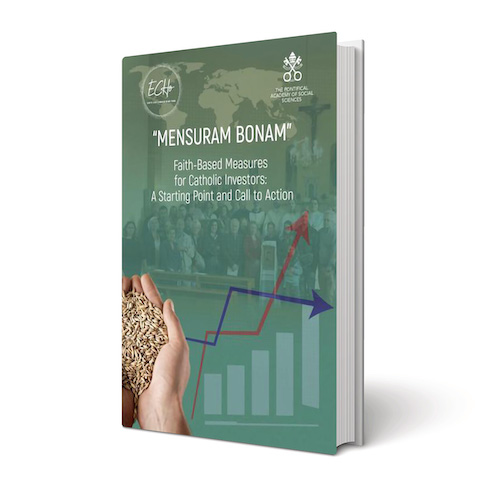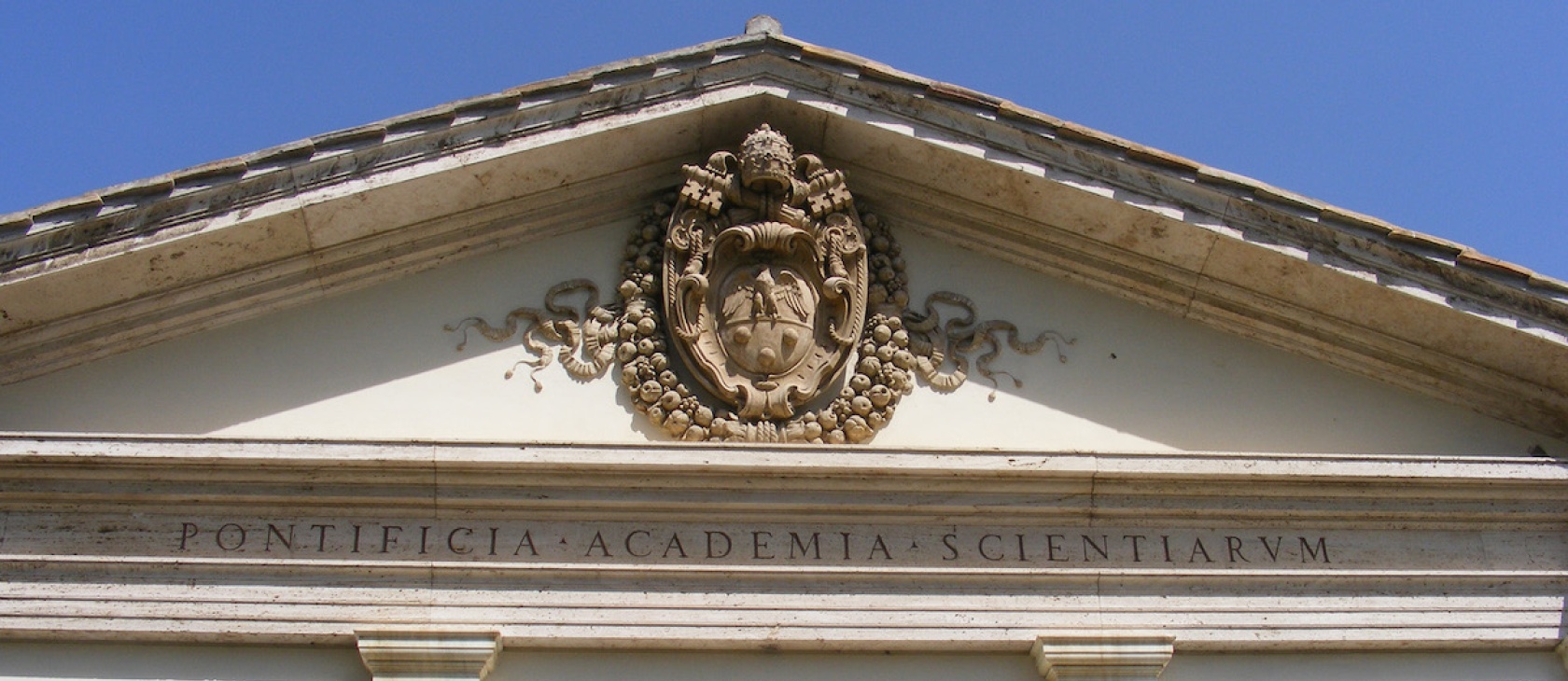When teaching Catholic social thought and business ethics, I warn against two reductionist fallacies. The first is the idea that government regulation is the solution to the absence of ethics within markets. While there may be situations in which government regulation is appropriate, or even necessary, we know that our fallen human nature, which causes many problems within markets, also afflicts regulators and so limits the efficacy and increases the dangers of trying to perfect markets through regulation.
A new document published by the Pontifical Academy of Social Sciences “hopes to shed the light of the Gospel and of Catholic Social Teaching on the specific area of economics and the world of finance.” But does it confuse more than enlighten?

Investors—A Starting Point and Call to Action
The Pontifical Academy of Social Sciences (2022)
The second false idea to be avoided is that markets do not need ethics. Some people argue that virtuous behavior is self-generated within markets or, indeed, that virtues are not necessary. To some extent, markets do encourage virtuous behavior: people want to stay at hotels where the manager smiles rather than is nasty, and we wish to buy financial products from people who are honest. But the untrustworthy can benefit from sharp practice, and this is especially so in financial markets. Christians therefore need to promote, as the Acton Institute tagline puts it, a “free and virtuous society”—and so we need both markets and morality.
The social teaching of the Catholic Church has said a great deal about these issues. Pope Benedict XVI pointed out, in Caritas in veritate, that “Without internal forms of solidarity and mutual trust, the market cannot completely fulfil its proper economic function” (emphasis in the original). This is certainly borne out by the economic evidence. As Nobel Prize winner Kenneth Arrow once noted, “Virtually every commercial transaction has within itself an element of trust. … It can be plausibly argued that much of the economic backwardness in the world can be explained by the lack of mutual confidence.”
In response to this demand for ethics in finance, we have had the development of ethical investment funds. The size of this sector is disputed. But one estimate, found in the Investment Leaders Group publication “The Value of Responsible Investment,” suggests that $34 trillion worth of investments are held by investors who have signed on to the UN’s Principles for Responsible Investment. But just because something calls itself ethical does not mean that it is. And something that does not describe itself as ethical may still be so. To quote Pope Benedict XVI again, “Efforts are needed … to ensure that the whole economy—the whole of finance—is ethical, not merely by virtue of an external label” (Caritas in veritate, 45).
A perusal of ethical investment funds in the U.K. uncovers one that does not invest in alcohol, gambling, nuclear power, oil, gas, or coal; another with a focus on healthcare but that seems quite comfortable investing in companies that provide abortion and abortifacient drugs; and another that avoids pornography, arms, gambling, and alcohol.
What is a Catholic to make of this? How should Catholics make their contribution to ensuring that people behave ethically in all branches of the economy, especially when it comes to the allocation of capital? Mensuram Bonam: Faith-Based Measures for Catholic Investors—A Starting Point and Call to Action, published by the Pontifical Academy of Social Sciences, is intended to help us.
Its title means “A Good Measure.” The authors are obviously pleased with the title because the English or Latin is mentioned more than 50 times. The document begins with this quotation: “Do not judge, and you will not be judged; do not condemn, and you will not be condemned. Forgive, and you will be forgiven; give and it will be given to you. A good measure, pressed down, shaken together, running over, will be put in your lap.”
One of the most puzzling things about the document is, in fact, its title. The explanations given for it—that we need metrics (or good measures) for evaluating integral human development and that the superabundance of God’s forgiveness sets the ethical norm for how belief is lived—are not especially convincing. But, in the analysis of the usefulness of the document, perhaps its title is not the best measure.
The document addresses Catholics involved in investment decision-making processes. It explicitly claims that its advice is the fruit of Catholic teaching and doctrine. This is important, because as Catholics our moral judgments have to be rooted in the Catholic faith. However, we hope that all people of goodwill will recognize the moral precepts that underlie a Catholic approach to finance and investment—the principles of natural law and the cardinal virtues that are accessible through reason alone. And so Mensuram Bonam can be of use to people of other traditions, too.
There is no doubt that the discussion provoked by documents such as Mensuram Bonam is needed. As noted above, the existing ethical investment fund landscape is not especially attractive to Catholics. As well as including investments that are plainly unethical, these funds often exclude things that Catholics do not find intrinsically problematic, such as alcohol. Ethical investment has also become aligned with “environment, social, and governance” objectives that are not always soundly based within a Catholic ethical framework. So there is a need, whether from a body connected with the Vatican, in academic discourse, from charities or think tanks, or from national bishops’ conferences, for a proper consideration of the factors that should be taken into account by Catholic investors.
Also important is that guidance is needed to inform investment practice by the institutions of the Church. Religious orders and dioceses are reconsidering their investment policies to align them with Church teaching. There is a growing number of Catholic investment funds that can be sifted through. Indeed, I sit on the ethical advisory board of one such fund. We think about the issues raised in Mensuram Bonam—and they are not straightforward.
So what exactly does the document say—and does it help?
The document reminds us that, as Catholics working in finance, we must marry faith and reason and prayerfully discern the right path. The reader is provided with a timely reminder that “for investors with faith, the view of the world formed by numbers and analytics is forever incomplete. Even brief moments in the presence of Scripture, or quick references to the Church’s teachings, can fill in by grace or wisdom those ethical gaps in perspective or process.” It is interesting that the secular “well-being” movement reminds us of the importance of breaks to unclutter our minds and relieve stress. As is so often the case, such movements have a glimpse of the truth. Mensuram Bonam is right: we should seek brief moments of prayer and listen to God in whatever work we do in the world—and this applies to fund managers, too. The economist might say, somewhat inappropriately, that there are diminishing returns to prayer! Of course, this is not true, but even two minutes every few hours can be very helpful. Saying the Angelus, for example, might be a good start.
These funds often exclude things that Catholics do not find intrinsically problematic, such as alcohol.
Mensuram Bonam also points out something of which most readers of this magazine will be acutely aware: “More than managing transactions strategically and responsibly, investors with faith are invited to regard themselves as immersed in a plurality of relationships. Indeed, the good measure of one’s meaning and happiness is from contributing one’s life, talents, work and resources to others, and to the world.” Markets are places of social encounter—even markets conducted over electronic platforms. And, as the document makes clear, this leads to the need for investors to ask themselves how today’s decisions as an investor specifically cooperate with God’s plan for creation and humanity.
It is made clear that Catholic faith-based investment does not simply involve excluding unethical investments. There must be engagement, too. Fund managers are asked in what way they are influencing governance. This is especially relevant to debates around investing in fossil fuels. Most religious orders, and many dioceses and Catholic institutions, have ceased investing in companies producing fossil fuels. But the world (including religious orders and dioceses) is still consuming them, so somebody must produce them. Is it better to disinvest or to engage with companies that may still be extracting fossil fuels?
Interestingly, Mensuram Bonam asks investors whether “the lobbying of companies or their influence on regulators align with an investor’s purpose and values.” Supporters of market economies are well aware of the problem of “rent-seeking” by companies and other interest groups. Even economists on the left, such as Joseph Stiglitz and Thomas Piketty, have joined the likes of James M. Buchanan, Gordon Tullock, and Luigi Zingales in writing about the problem. Indeed, lobbying and rent-seeking has been mentioned as a problem by Pope Francis. It is, indeed, unethical for companies to use the political process to pursue their own private interests. And Catholic investors should engage with those corporations in which they own shares to restrain such behavior.
There follows a summary of how grace and fidelity to God must be at the center of our commitment to the common good and a discussion of Catholic Social Teaching (CST) and its relationship to economic life. This will be helpful to the non-Catholic reader of the document and will save users from having to consult several sources.
We then come to the concrete, practical suggestions on which many reviews have focused. The document lists a series of questions for discernment under each principle of CST. They include “Are human rights fully respected?” “Are other persons respected or commodified?” and “Is authentic sustainability being realized (and ‘greenwashing’ avoided)?” Mensuram Bonam asks investors to contemplate, discern, and propose, following Pope Francis. Investors should then deploy a strategy of engagement, enhancement, and exclusion.
As for the exclusion categories, the document recognizes that “the moral imperative sometimes presents clear situations in which exclusion without exception has to be applied, such as involvement in abortion. There are also grey areas that may require discernment before an informed, moral decision can be made. These include the abuse of ‘speculative products or investment techniques.’” Some Catholics have complained that abortion and environmental harms are put in the same table of potential exclusions, but the document makes clear that a process of discernment would lead them to be treated differently.
This is all useful, even if familiar to many Catholics in the investment world. The document is not beyond criticism, however.
To say that Mensuram Bonam could have been better written or edited is an understatement. It certainly scores more highly for content than for style. And some things seem a little muddled. At one point it argues that concerns that mixing faith and ethics with investment criteria will reduce returns have been “largely refuted.” And “there should be little to no fear of underperformance.” But then it states: “Some investment instruments and forms of investment, due to their inherent characteristics, are unsuitable for combining the use of capital with the promotion of the common good—even if this means that investors lose out on the benefits (for example, diversification).” Surely the latter is true. And, if diversification benefits are lost, returns for a given risk will, in fact, be reduced. Ethical approaches to investment will likely require sacrifices in terms of financial returns. As the document itself wisely makes clear, financial returns are not the only good measure of the appropriateness of an investment.
Should we invest in a bus company that has a profitable route but that happens to take mothers and nurses to an abortion clinic?
Some important ground was also omitted. There could have been more consideration of virtue ethics, which is a good starting point for Catholic investors. Mensuram Bonam could also have presented a more systematic approach to dealing with exclusions that are perhaps the most immediate practical consideration for faith-based investors. What do we do when deciding whether to invest in a company performing abortions? That’s easy enough. But what if the company produces the chemicals that some abortion providers buy to perform abortions? What if the intention of the company producing them is that they are to be used for a licit purpose, but some abortion providers happen to buy them? How about a real estate investment trust that lets part of one of its properties to a company that is an investor in a company that sells such chemicals? Should we invest in a bus company that has a profitable route but that, among other passengers, happens to take mothers and nurses to an abortion clinic?
This all takes us into discussions about different forms of cooperation with evil. This is highly relevant to practical decision-making in Catholic investment funds and deserved a longer treatment.
Perhaps that will be the subject of a follow-up paper. But while Mensuram Bonam should not be the last word, it is nevertheless important. It is a reminder that we should never succumb to the risk of bifurcating our lives. Going to church on Sunday and then recklessly making as much money as possible, by whatever means possible, during the week is not a defensible lifestyle for Catholics—or for anyone.




